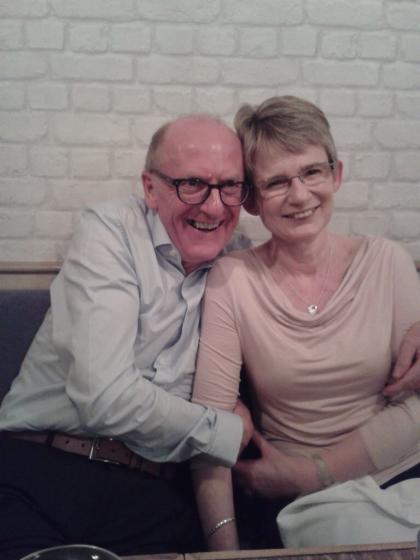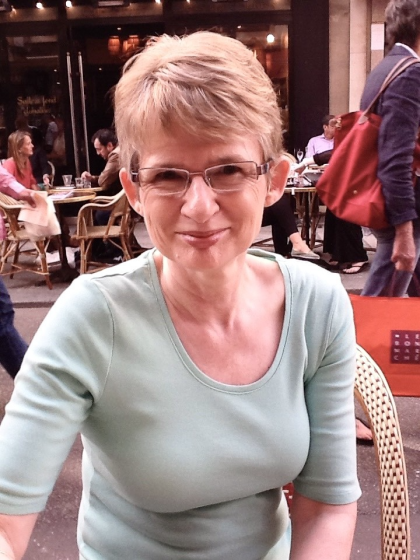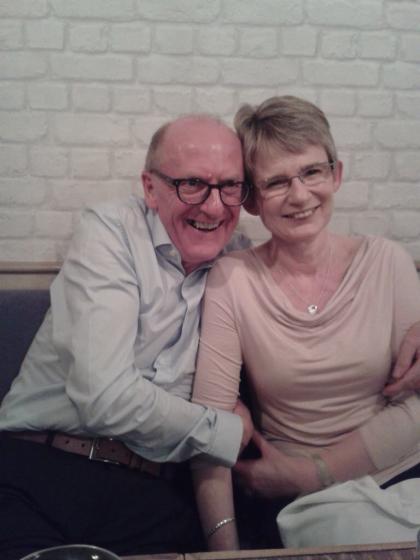Stephen and Julie's story
My wife Julie was the love of my life.
Stephen

Opposites attracting couldn’t have been truer than with us. I was the extrovert, she was the introvert. She liked to be well-organised, and I liked her organising me!
We met in our twenties and shared ten years of friendship before 35 years of marriage. Julie was a strong-willed woman of great poise, a dedicated mother and totally loyal to everyone she knew.
Julie was an oncology nurse but became a full-time mum to be a role model, a teacher, confidant (and sometimes mediator!) to our two sons, Alan and Jack. She dedicated her life to these boys and would often be seen playing football and cricket on windswept beaches across Ireland. Our sons have excelled as a result of her both sage and profound influence on them.
Watching my soulmate lose her life to ovarian cancer was very painful for us all particularly the indignity laterally suffered by a proud woman who, until then, had always been in control of her life…and mine. This disease sneaked up on us and stole her away. Now I spend my nights alone and as I sit on our sofa without me, as always, holding her I wonder whether it could’ve been so different.

From 2020, Julie made repeated visits to the GP with symptoms of ovarian cancer, which over the following three years became persistent and gradually worse. She had continuous pelvic pain and then toward the end of this period started to gain weight around her waist yet had little appetite.
In fairness to the GPs, both a CA125 blood test and an ultrasound scan were carried out. The CA125 result however indicated she was within a normal range (between 1 and 30 – she was at 25), and the ultrasound reports weren’t clear due to obstructions.
In June 2023, Julie was referred by her GP to a consultant gynaecologist due to persistent gynae infections leading to a CT scan which immediately revealed suspected ovarian cancer which was confirmed by a biopsy.
Julie was diagnosed with stage 3c ovarian cancer and despite her diagnosis, she remained poised, as was her nature.
She was put forward for debulking surgery (an operation which removes the visible signs of cancer), however during the operation the surgeon saw that it had spread further than expected and, sadly, the operation was not progressed. Julie underwent chemotherapy almost immediately and no matter how ill she became, her medical knowledge remained razor sharp, even correcting one of her consultants about the list of medications that she was receiving!

Julie died in June 2024 from ovarian cancer, and I will spend the rest of my life campaigning to improve awareness, diagnosis and treatment of this disease. It's my mission. I've been working with Target Ovarian Cancer, and according to the charity’s Pathfinder research, GPs report that they find it difficult to know when to re-test following a normal or nominally elevated CA125 and some requested more clarity on next steps when an ultrasound report says that the ovaries were not visualised.
I believe if there was more support and funding into preventative and diagnostic measures Julie’s story could've been different. Funding towards education and training for GPs to help recognise the signs, interpret tests and know what do if symptoms persist is key, but also to consider ovarian cancer as a possibility as a priority needs to be paramount.
We need to ensure the symptoms of ovarian cancer are known to every woman. Indeed, given my very personal experience as a widower, men should also be aware of them as if I'd known them I could've better advocated for her.
Knowledge is power and could lead someone to approach their GP and ask directly about ovarian cancer.
Perhaps GPs could have the mindset of ruling it out or confirming it at an earlier stage as ovarian cancer needs to be diagnosed early to give women a better chance of surviving the disease.
Symptoms awareness – namely a government funded awareness campaign – alongside more funding of effective diagnostic testing I think could lead to earlier diagnoses.

In summary, my experience of Julie’s ovarian cancer journey, leads me to the conclusion that more direct pathways can and must be introduced to obtain faster diagnosis for women presenting with its symptoms and for women to do that they need to be aware of its (what I describe as) “sneaky” symptoms.
To say I miss Julie every day isn’t enough. It doesn’t cover the deep, dark loss I feel in my heart. The thing about grief is that there are new experiences to go through all the time, without the person by your side. It’s devastating, and incredibly lonely.
There are better ways to reduce this disease from taking lives too soon, like Julie’s. They must be actioned.
If you’ve been affected by this story and would like to speak to a specialist nurse, you can call our free support line on 0808 802 6000 or contact us: [email protected]. We're open from 9am until 5pm, Monday to Friday.
Legal Disclaimer:
EIN Presswire provides this news content "as is" without warranty of any kind. We do not accept any responsibility or liability for the accuracy, content, images, videos, licenses, completeness, legality, or reliability of the information contained in this article. If you have any complaints or copyright issues related to this article, kindly contact the author above.
